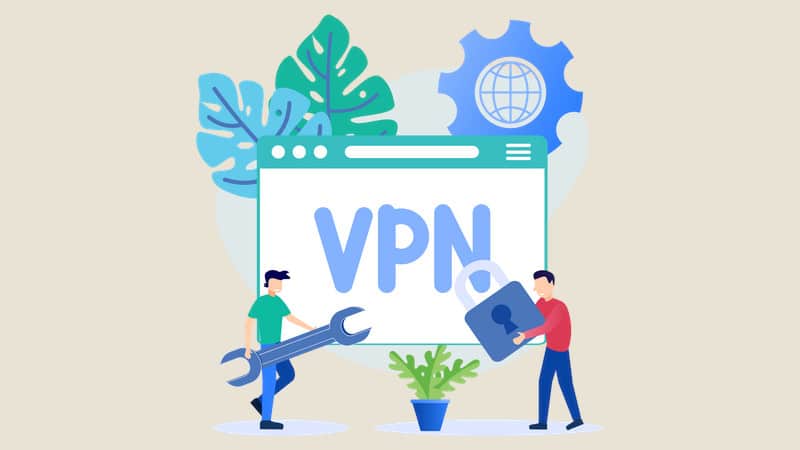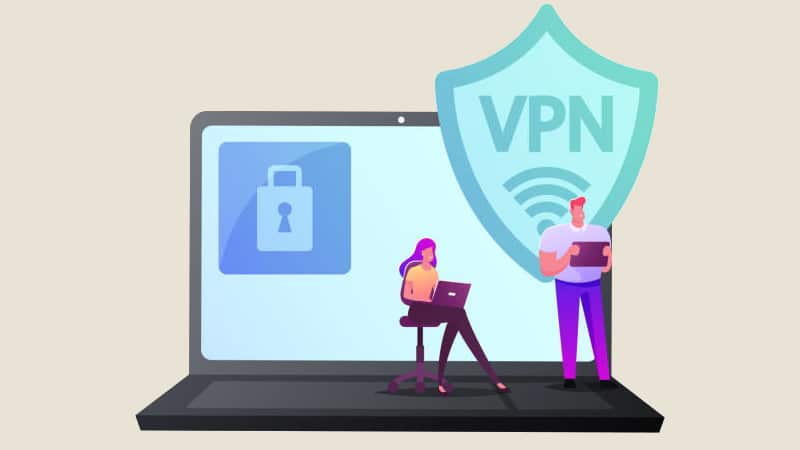A VPN, or Virtual Private Network, is essential for secure, confidential Internet browsing. It's also a useful tool in Data Science, especially for data protection. Find out all you need to know!
Over the past few decades, the Internet has transformed our lives. This technology is now ubiquitous, from computers to smartphones and everyday connected objects.
It offers countless possibilities, from information retrieval and communication to online shopping and streaming services.
However, surfing the web also involves a number of threats. Theft of personal data and surveillance by authorities and governments are perfect examples of the dangers lurking on the web.
Fortunately, there’s a technology that was first developed in the corporate world and is now widely used by the general public: VPN, or Virtual Private Network.
What is a VPN?
A Virtual Private Network (VPN) is a service for connecting to the Internet securely and privately, by routing the user’s traffic via a remote server.
It creates an encrypted tunnel between the user’s device and the VPN server. This prevents unwanted third parties from intercepting data.
VPN also masks the user’s real IP address, giving him or her an anonymous online identity.
The history of this technology dates back to the early days of the Internet, when researchers began exploring the possibilities of connecting computer networks together.
As early as the 1970s, protocols such as Point-to-Point (PPP) were developed to enable users to connect remotely to private networks via telephone connections.
However, these early connections were limited in terms of security and capacity. As computer networks developed, companies became aware of the importance of security for data transmitted over public networks.
This led to the emergence of protocols such as IPsec (Internet Protocol Security) in the 1990s. This made it possible to secure connections between private networks via the Internet. Its encryption and authentication capabilities were reliable, but its implementation required technical expertise.
At the same time, the SSL (Secure Sockets Layer) protocol was born, before evolving into TLS (Transport Layer Security). Again, these protocols were developed to secure connections between web browsers and servers.
It wasn’t until the dawn of the 20th century that the modern concept of VPN emerged. Initially, they were used mainly by companies to enable employees to access internal resources securely from outside the network.
Using specific software to create an encrypted tunnel between their devices and the internal network, employees could connect remotely.

Over time, this technology has also become popular with individual users wishing to protect their privacy and bypass geographical restrictions.
With the advent of cloud computing and online services, demand has risen sharply, as VPNs enable secure connections between local corporate networks and cloud service providers.
Now used by many organizations and millions of individuals worldwide, VPNs offer a host of advanced features to meet the specific needs of both personal and business use. Here are some of the benefits.
What are the advantages of VPNs for cybersecurity?
Using a VPN brings several major advantages when it comes to cybersecurity. First of all, their advanced encryption protocols protect the personal data you send and receive online, so that even if a hacker manages to intercept the information, it will be totally unreadable without the appropriate decryption key.
This is particularly useful when connecting to public WiFi, as these networks are often targeted by cybercriminals. By encrypting communications, VPNs enable you to surf with peace of mind, whatever the circumstances, and guarantee confidentiality of information for online banking transactions or the most sensitive business communications, preventing theft and interception.
VPNs are also widely used in countries where the Internet is censored by the government. By connecting to a server located abroad, it is possible to bypass the restrictions in place on websites and online platforms.
By the same token, VPNs enable access to geo-restricted content. On Netflix, for example, the series available vary from country to country. Many users choose to use a VPN to connect to a server in another country and enjoy all the content that interests them.
In addition to security, a VPN also enhances privacy. IP address masking prevents websites, advertisers and ISPs from collecting information on a user’s activity, enabling fully anonymous browsing.
It’s also a good way of blocking advertising tracking tools to avoid targeting based on your data.
What are corporate VPNs good for?
With the rise of telecommuting, many companies have adopted VPNs. VPNs offer an ideal solution, establishing an encrypted tunnel between employees and the company’s Internet network, enabling employees to access internal resources securely, while protecting sensitive data from cyber-attacks.
What’s more, these virtual private networks ensure secure communications between a company’s various sites, eliminating the risk of interception when transferring files or exchanging confidential information.

VPN and Data Science: a valuable data protection tool
VPNs play an important role in Data Science, especially for data protection.
Data Scientists very often work with large, sensitive datasets, and using a VPN enables secure remote access to them.
The encrypted tunnel between the Data Scientist’s device and the network on which the data is stored ensures that data is not compromised during transfer.
Similarly, encryption of data traffic prevents unwanted third parties from intercepting or reading it. This is particularly useful for sensitive information such as personal or business data.
When data science teams in different geographical locations need to collaborate remotely, VPN also enables secure, private communication between members.
So they can share sensitive information, analysis results or models without compromising data security. Even when connected to unsecured networks.
In the face of Man-in-the-Middle attacks that can compromise data security during transmission, VPN also offers an extra layer of protection by encrypting data and verifying the authenticity of connections.
Conclusion: VPN, an indispensable cybersecurity tool
At a time of rising risks of cybercrime, VPNs have become indispensable shields against the dangers of the web. That’s why many private individuals use them just as much as businesses.
They also help protect personal data, making them valuable allies for data scientists and other data science professionals.
To learn how to master all data protection tools, you can choose DataScientest. Our various training courses enable you to acquire all the skills required to work as a Data Scientist, Data Analyst, Data Engineer, Machine Learning Engineer or Data Product Manager.
In addition to VPNs and other cybersecurity tools, you’ll learn to handle the Python programming language, databases, Big Data analysis tools, Business Intelligence and DataViz solutions, and Machine Learning techniques.
All our training courses are distance learning and eligible for funding options and lead to a certification issued by Mines ParisTech PSL Executive Education that is highly recognized by companies. Discover DataScientest now!










